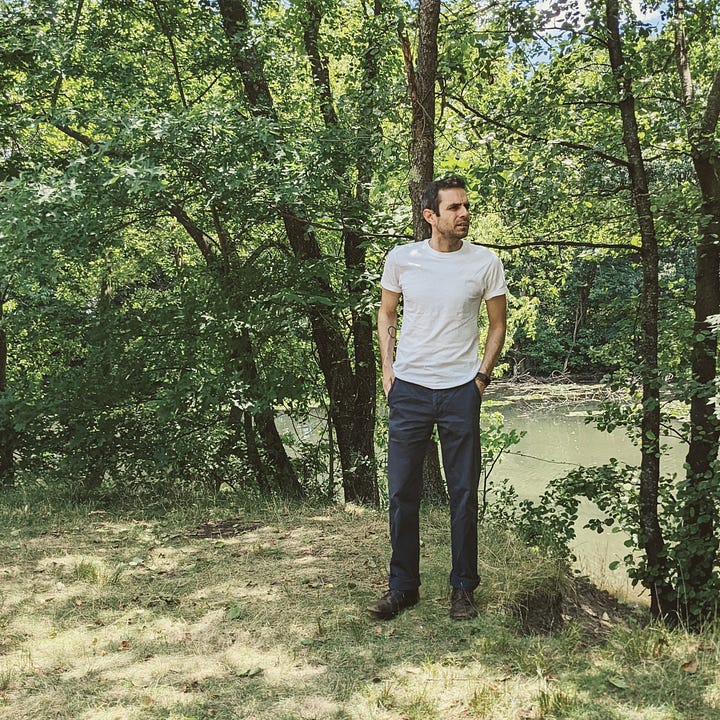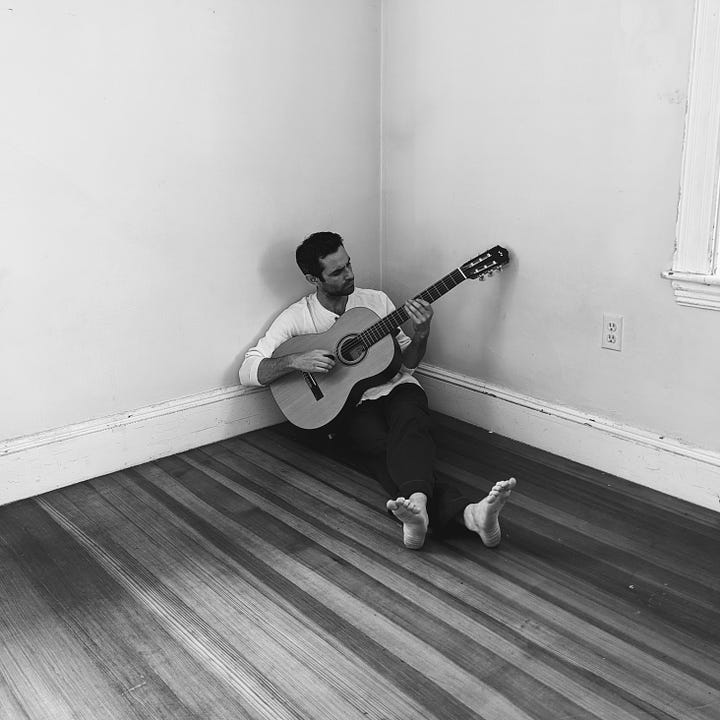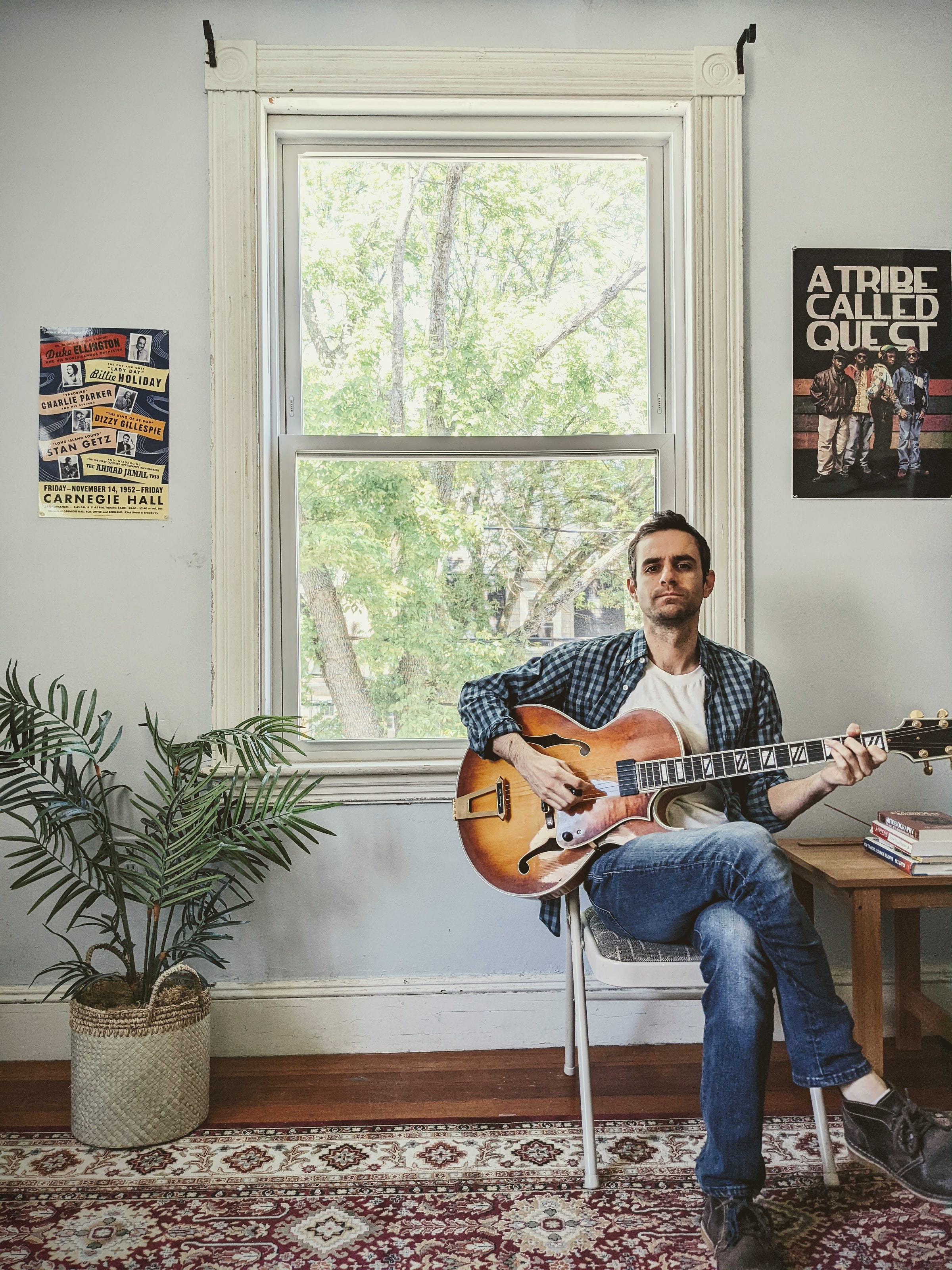There are loads of interviews out there with famous jazz musicians. A few I’ve quoted from in the last few weeks in our exploration of jazz from different angles.
But I wanted to get at something nuanced and personal about jazz that has nothing to do with fame. It doesn’t mean that the musicians above haven’t each reached some level of fame, but I was looking for a more intimate conversation. I also wanted to highlight a few musicians I know from my hometown of Lexington, Massachusetts, where the music program under Jeffrey Leonard is renowned. This is the experience and place from which I gained my appreciation for many kinds of music on a deeper level.
In the first Jazz article, I wrote a little about Jeff as well as Ken Ross, a former student of mine who also studied with Jeff and is now a professional musician. I described Ken as one of my most memorable English students; Jeff said something similar about Ken when we caught up the following week. I think you’ll see in this interview that jazz and music are a part of Ken, not only because of his profession but because he considers the way everything works together within an individual system and community to harmonize and create. Here’s a clip of him talking about just that:
It was so cool to catch up with these wonderful people from my past and listen to their journeys. I’m grateful that this project has helped me connect or reconnect with so many interesting artists and writers. I’m writing these interviews up in the order I completed them, starting with Ken this week. There are some implicit lines of progression through the discussions. I hope you enjoy the conversations and check out some of their work. We would love to hear your thoughts in the comments as well.
Ken Ross
Ken Ross is a multi-instrumentalist and composer/producer from Boston, Massachusetts. He has written award-winning songs as well as won awards for his skills as a performer. He has performed at venues such as The North Coast Music Festival, the Litchfield Jazz Festival, and the Monterey Jazz Festival, among others.
Ken currently resides in Boston where he writes and records his own original music, as well as collaborates with other local and international artists. He performs frequently around the city.
You can find some of his music on Soundcloud and follow him on Instagram to discover live shows in the Boston area and check out more of his original compositions (two are embedded in this article).


Kate: How would you describe the music you play?
Ken: Although the music I play now would probably be called indie R&B, it has some roots in jazz music. I studied jazz and still include it in a lot of the music that I write and record.
And I’m still doing wedding bands. Haven’t given that up yet!
[Ken played with a band at my first wedding back in 2010. Later, Ken tells me he is teaching music as well. It seems to give him a lot of joy. It’s hard work making a living as a musician, but the avenues have also led Ken in some pretty cool, unexpected directions.]
When did you discover music for yourself and what kinds of music did you play then?
I think I knew I wanted to be a musician when I was in middle school. Probably around there. I always knew I wanted to be an artist, back when I was a kid. You can see the painting in the background, that was done by my aunt. My grandmother was an artist; my dad is an amateur artist…
So, I wanted to get involved with art but I failed on it, because it seemed too introverted for me. With music, there was always the idea I could spend time with other people. You know, collaborating in bands and being in part of an orchestra or something. That sounds like a better fit for me rather than being, like, the lone cartoonist sending his work out every week and working in isolation. So, I just thought music would be a good fit.
[Ken then talked about studying under the tutelage of Jeffrey Leonard (interviewed below) and the way he inspired him to keep going. “I’m really grateful for my hometown music program.” I concurred, even though I don’t play music these days.]
I also played the clarinet in the band and wind ensemble under the guidance of Jeff [Leonard]. And he introduced me to jazz even though I wasn’t playing it. I remember when he brought in Joshua Redman one day, unannounced. It was amazing! After talking with us, he was playing with Jeff and other jazz musicians, friends of mine. And I was really inspired but also intimidated. How do you learn to play such a free kind of music? I guess I mean improvisation specifically. How do you get past that and get the confidence?
It must have been pure teenage hormones or something. Because even now, I’ll pick up something I want to play, even last night, and I’ll say to myself: jeez, this is so tough! There are classical musicians out there who will just say: Absolutely not; this is asking too much for me. There are just so many entry level skills you need to develop.
It was just peer pressure. Purely. I had friends who were going home and studying really difficult music when they were fifteen. Some of my friends I was playing with junior year are up for grammies this year.
Jeff is a goldmine of some of the best musicians out there now. There’s people like Luke O’Reilly — the best piano player in Philly, no maybe in the East Coast — and Raviv Markovitz [below] — one of the best bass players in the world. The list goes on.
So it wasn’t so much of a personal thing. It was being part of an institution. There was such a high quality of training throughout the Lexington music program, at least from 1990 or so until about 2015. [Jeff Leonard retired in 2017 from working at Lexington Public Schools.]
How did playing jazz and also working with these groups impact your identity or your personality?
The art form can really inspire you to be a greater human being. I don’t know how much of that I’ve achieved, but when you’re standing on the shoulders of giants, it can be very humbling. They can inspire you, basically, to look more critically at the paths that have been laid before you and how you can fit into that.
I was studying Miles Davis, John Coltrane, Quincy Jones, guys that had awful stories growing up. They experienced racism and abuse, but persevered. And achieved great things. You know, you’d hear something like this is a world class trumpet player who was beaten by the cops months before, and is now on a record playing beautiful music.
And you were really aware of all that history in high school when you played?
Yeah, exactly, I really felt like the two went hand in hand. You know you can’t be a music appreciator without understanding who the musicians are and what the context was for the music being made.
I think that give me a lot more perspective than a typical Middle East indie rocker [a Boston area music club]. I also learned a lot more about American history from my experience with jazz.
That’s a really interesting answer. I was going to ask as well what you think jazz has to do with American history? Is it specifically connected to Black history or a unified history? How do you see it?
Well it’s definitely an African-American art form at its genesis but it’s also become a thing of its own. There are so many world-wide genres, like salsa or afro-jazz. But if you really want to look at essential jazz music it can’t be separated from Black musicians from New Orleans, for example.
I can attribute a lot of this understanding again to Jeff. He is a real musicologist and he would spend a lot of time with us researching the music we listened to and played. He also inspired me to do a lot of my own research. I feel so grateful for the place I came from. You know, as much as you want to kind of hate the town you grew up in, it was an incredible experience.
Earlier you mentioned to me that you took a break from music a few years ago and discovered yoga and meditation. Can you tell us if that’s had an impact at all on the way you make music or what it means to you?
Oh, yeah, definitely. A hundred percent. Visualization is such a huge component of being an artist. I guess some people are just self actualized; they understand their purpose and have a lot of confidence in what they do.
I think, for me, that kind of clear line going throughout life and my career and navigating the world both as an artist and just as a human being, I was just kind of running on fumes after getting through school and music school. They ask very specific things of you. And then I was just trying to merge into this pop culture space and — I just realized I was done with it.
And now, I have such a greater appreciation for just waking up — playing music — playing the guitar — playing piano — writing music — the actual enjoyment of performing music — the gift of getting to play on stage with different people — sharing music with different people of different generations.
So I can really credit yoga and meditation in that year or two to sort of mature and get above the idea of fame and financial success, away from the idea of other people’s expectations or that twenty-something idea of ‘wanting to be a rock star.’ People had ideas for me that had nothing to do with what I wanted or who I am
It sounds like it gave you a kind of strength in yourself to also learn how to pivot when you need to.
When the road gets tough the tough get going. And if you don’t have the tools to get going, you’re in trouble. This gave me a kind of toolkit to deal with it. When things go haywire, this is how you can be resilient.
So improvisation on stage…how does it feel? What is the experience for you? Is there a meaning behind it for you? Or maybe there’s not…
Music itself is just such a natural expression of the human existence. From the time you’re a kid, you probably liked singing songs, humming tunes, padding drums on tables and stuff, right? So I think it’s just an expression of existence.
So then music — this is everyone’s gripe with classical music is that it can be so uptight. You know you practice the same piece. It’s like memorizing the digits of pi. You know you memorize the whole thing, a hundred digits, and then you just get on stage and just play it exactly the way it is: 3.141592…. And people applaud. You do it perfectly and the crowd goes wild. And sure, that’s one kind of performance and it can be really [impressive].
I think the beauty of improvisational performances is like an expression of the human existence in real time. So anything I’m feeling… there’s was this one gig I was playing downtown in Boston. The Business Improvement District created a stage above one of the T stops, Downtown Crossing. It’s on the backside when you come out from underground. It’s got seats and a stage. They hire performers…
They actually pay? That’s great.
Yeah, it’s great they actually pay us to play, more than most of the bars I play at. So any day I play, I’ll have all sorts of people. A group of kids, people from AA coming out from a lunch break, skateboarders with a boombox who want to play their music over you, police, sirens, just so many different things going on.
One thing that’s cool about that is I’ve studied all my scales and my chords for decades now, and I have a real ownership over the instrument in a lot of ways. That’s part of the intimidation of jazz; you have to have so much technique together [before you can improvise]. I’ve done a good job working on that over the years, so I can respond to a lot of these things as they happen in real time and express kind of the honor that it is to be a part of this community all at once and try to inspire other people with whatever comes out of my instrument at that time.
I think that’s what inspired me back in the day. I would go to these jazz concerts. I felt like they were speaking right to me, even though I’d never met any of [them]. It would just be at a bar in Cambridge [Massachusetts] or something. The ability of jazz musicians to make a real time connection with the audience is I think the beauty of jazz music. And that’s why I love playing it and that’s why people have loved playing it for over a hundred years.
What’s your relationship with jazz? Or how might you answer one of the questions above differently based on your own experiences? How does your own creative process relate to the ones discussed above?
This post is open to all. If you’d like to make a comment, please subscribe for free.






